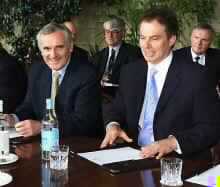WESTON PARK, England (Reuters) - Northern Ireland peace hopes staggered on with British Prime Minister Tony Blair reporting progress but no breakthrough on Saturday in crisis talks with rival Protestant and Roman Catholic politicians.Under the threat of growing violence and an August deadline for governing the British province, Blair said the latest round of negotiations with the feuding parties ended with the landmark 1998 Good Friday peace pact still intact.
A statement issued by Blair and Irish Prime Minister Bertie Ahern said that in the next step, the two governments were preparing a new comprehensive peace package to present as soon as possible to majority Protestants and minority Catholics to consider.
An authoritative source said it was hoped the package would be ready within a week or so.
It would cover the key issues of paramilitary disarmament, reforms to Northern Ireland's police force and a reduction in the size of the British troop force there.
The statement said that although the negotiations were over, peace was still possible.
``We've made progress,'' it said.
``We're not coming to you to say this is all done, but we believe it can be done,'' Blair told reporters.
``We believe we can put a common package together that can be accepted by people,'' he said. ``We do that and then we wait for the answers from the parties.''
``We believe the package contains all elements for full implementation of the (Good Friday) peace accord,'' Ahern said.
THREAT OF VIOLENCE
Blair and Ahern gave no idea of what would happen if the package was rejected, but most analysts believe there would be a return to high level violence to press each side's case.
The talks over the past week at a secluded country house in the English Midlands followed days of violence in which more than 300 police were hurt in riots by both sides in the Northern Ireland capital, Belfast.
Police used water cannon and plastic bullets regularly during the week after they were bombarded with petrol and acid bombs.In hard-line comments from the province's Catholic and Protestant politicians going into Saturday's last round of talks, Protestant leader David Trimble said the key issue was progress on disarmament by the Irish Republican Army.
The IRA, which wants a united Ireland, says it has put its weapons beyond use in secret internationally-inspected arms dumps.
But Protestant leaders want the weapons destroyed and out of circulation completely.
Martin McGuinness, chief negotiator for the IRA's political ally Sinn Fein, had said Blair was not listening to his side's arguments that progress should also include bringing more Catholics into the province's police force and decreasing the number of British troops.
Trimble quit as Northern Ireland's First Minister on July 1 over the IRA's failure to disarm, setting off the present crisis.
SUSPEND EXECUTIVE? CALL ELECTIONS?
If the package is not acceptable to the warring parties, Blair must decide whether to suspend Belfast's power-sharing executive of Protestants and Catholics or call fresh elections for it by mid-August.
Sinn Fein leader Gerry Adams signaled his side believed they achieved one of their main aims in Saturday's talks by getting the British and Irish governments to tackle all disputed issues in the package, rather than just disarmament as Trimble's followers wanted.
Blair has insisted it is the last opportunity to revitalize the Northern Ireland peace process, which has descended into a quagmire as the Good Friday agreement was challenged.
The agreement brought a respite to decades-long violence in which 3,00 people have died and restored home rule to Northern Ireland after years of direct control from London.
The IRA and other mainstream guerrilla groups are observing cease-fires while the politicians talk.
PHOTO CAPTION:
British Prime Minister Tony Blair (R) and Irish counterpart Bertie Ahern sit down in a round table session as part of the Northern Ireland peace talks at Weston Park in Staffordshire July 14, 2001. Northern Ireland's political leaders resumed peace talks after British Prime Minister Tony Blair agreed to extend the deadlocked talks into the weekend. (Ferran Paredes/Reuters)
- Author:
Reuters - Section:
WORLD HEADLINES


 Home
Home Discover Islam
Discover Islam Quran Recitations
Quran Recitations Lectures
Lectures
 Fatwa
Fatwa Articles
Articles Fiqh
Fiqh E-Books
E-Books Boys & Girls
Boys & Girls  Women
Women










